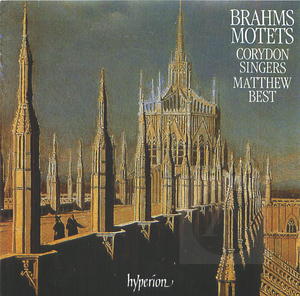
Brahms: Motets
composed by Johannes Brahms, 1833-1897; conducted by Matthew Best; produced by Mark Brown, 1962-; performed by John Scott, 1930-, Christine Barratt and Joya Logan, Corydon Singers (Hyperion), 1 hour 12 mins
Details
- Field of Interest
- Classical Music
- Composer
- Johannes Brahms, 1833-1897
- Conductor
- Matthew Best
- Content Type
- Music recording
- Duration
- 1 hour 12 mins
- Recording Engineer
- Anthony Howell
- Ensemble
- Corydon Singers
- Format
- Audio
- Sub Genre
- Motet, A Cappella, Piece, Song, Psalm
- Label
- Hyperion
- Performer
- John Scott, 1930-, Christine Barratt, Joya Logan
- Producer
- Mark Brown, 1962-
- Date Recorded
- 1989-10-21
- Review
- It always comes as a relief to turn to the a cappella motets of Brahms. In them the composer was no less profound, or deep, or intellectual, or sentimental than he was in his other works, but here these elements are more austere, more concentrated, more sublimated into the warp and woof of the musical fabric. In the motets, the listener gets the sense that one is hearing the true Brahms, unadorned by the trappings of instrumental color and virtuosity.
The true Brahms was a darkly pessimistic composer, a composer who could set the bleakest texts without flinching, who could look into the bottomless abyss of life and death and not turn away. Brahms' setting of Job's curse "Wherefore is the light given to him that is in misery" is unrelenting in its grim melancholy. And that setting is cheerful compared with Brahms' final three motets: "I am but sorrowful," "Ah, poor world, you deceive me," and "When we in direst distress" are among the most sorrowful settings in the German language.
Herreweghe's interpretations of the motets are beautiful. His choirs sing with a rounded tone and blend into a warm sonority without sacrificing clarity of articulation. Harmonia Mundi provides them with a resonant but not overly large acoustical setting. Everything is perhaps too beautiful for Job and death and sorrow and pain, but beautiful nevertheless.
Highly recommended. ~ James Leonard, All Music Guide - Subject
- Classical Music, Music & Performing Arts, Romantic, Late Romantic, Romanticismo, Romantica, Romantismo Tardio, Romanticismo Tardío
- Keywords and Translated Subjects
- Romanticismo, Romantica, Romantismo Tardio, Romanticismo Tardío
